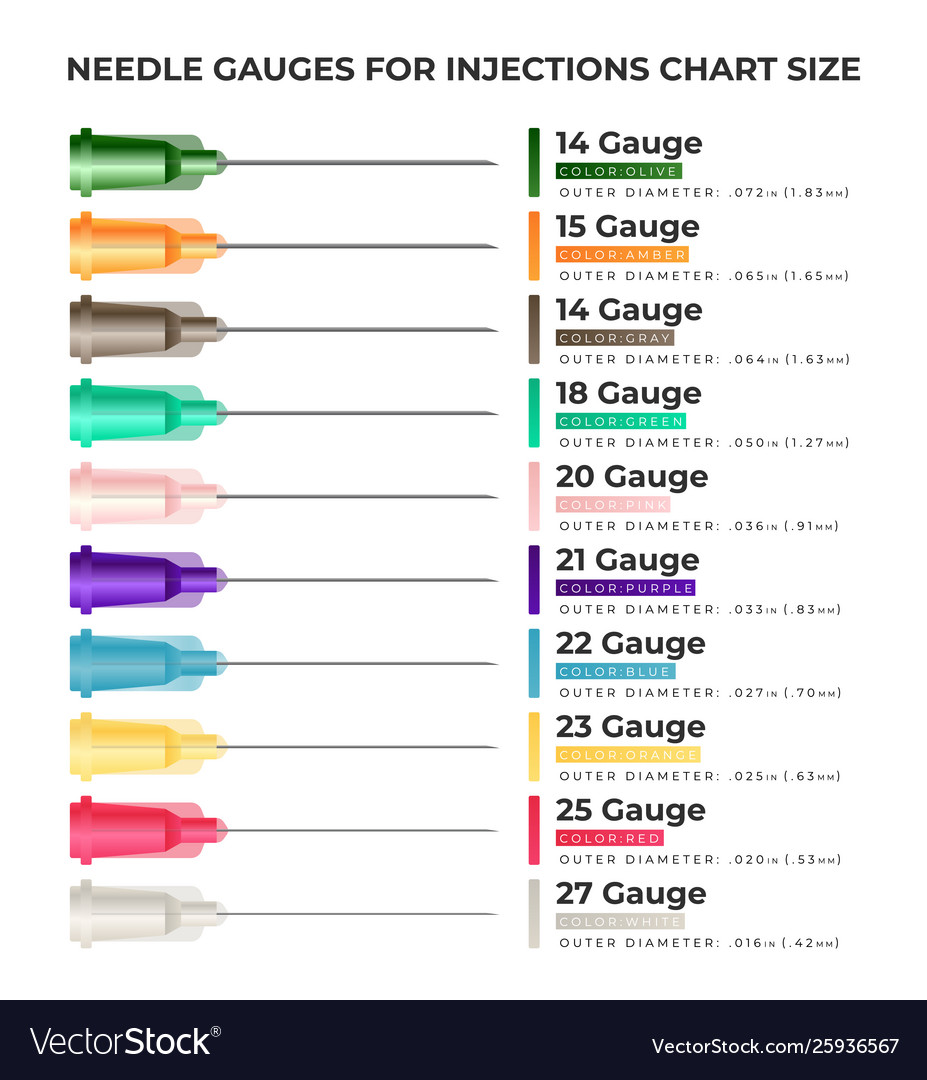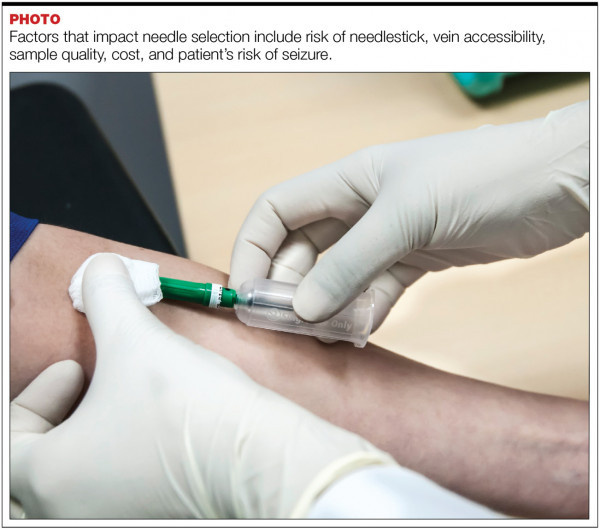Blood Draw Needle Size
Blood Draw Needle Size - It is light blue color coded. Web the size of the phlebotomy needle used is crucial for a successful blood draw. The higher the gauge, the smaller the hole. Web when we talk about the gauge of a needle we are referring to the size of the hole in the needle. Small children and infants are the most common patients to be drawn. Below is a phlebotomy needle size chart that outlines common gauge sizes and their typical uses: Most adults who are healthy have plump and bouncy veins. The 21 gauge needle is the standard gauge needle for drawing blood. The 21 gauge vs the 23 gauge needle. Web proper needle selection for blood collection : Here are the basic steps to drawing blood: It is light blue color coded. Web it is essential to assess each patient individually and consider these factors when selecting a phlebotomy needle size to ensure a successful and comfortable blood draw. Using the wrong needle size can lead to complications such as hematomas, collapsed veins, or inadequate blood samples. Most adults who are healthy have plump and bouncy veins. The butterfly comes in different brands and the unit is probably the same across brands, however, the. Web even for a routine blood draw, the wrong needle size can result in blockage and the need for a second draw if a large quantity of blood is needed. They are sterile and sealed with a paper tab to indicate prior use or tampering. Web a butterfly needle is a popular choice for drawing blood, getting iv fluids, or receiving certain medications. Blood collection needles have beveled tips and are typically available in 20, 21, and 22 gauges and 1 to 1.5 inches. Because a needle is left in the arm rather than a catheter or picc line for the purpose of an infusion, a butterfly needle can damage a vein if the unit is suddenly yanked. Small in size, or that roll. Needle gauge typical use 16. The lower the gauge the wider the hole. Using the wrong needle size can lead. Because a needle is left in the arm rather than a catheter or picc line for the purpose of an infusion, a butterfly needle can damage a vein if the unit is suddenly yanked. Drawing blood from a patient can be a daunting task, but it also is a necessity for nurses. The 21 gauge vs the 23 gauge needle.. The 21 gauge needle is the standard gauge needle for drawing blood. The most common gauges used for drawing blood range from 21 to 23, with maybe the 23 gauge being the one used the most. Despite the phlebotomist’s efforts to anchor the vein, the patient may be unwell or have minimal sites to choose a vein from, requiring a. Web how to draw blood. Web a butterfly needle is a popular choice for drawing blood, getting iv fluids, or receiving certain medications. Web even for a routine blood draw, the wrong needle size can result in blockage and the need for a second draw if a large quantity of blood is needed. Despite the phlebotomist’s efforts to anchor the. Despite the phlebotomist’s efforts to anchor the vein, the patient may be unwell or have minimal sites to choose a vein from, requiring a smaller needle. Next, identify the vein that you will be using. The right needle size ensures that the blood can be collected quickly and efficiently without causing excess pain or discomfort to the patient. Web when. Here are the basic steps to drawing blood: Web the standard length used is about 3/4 inch, which makes the butterfly needle attractive for patients who has a fear of needles. Below is a phlebotomy needle size chart that outlines common gauge sizes and their typical uses: The higher the gauge, the smaller the hole. Web a butterfly needle is. Next, identify the vein that you will be using. Below is a phlebotomy needle size chart that outlines common gauge sizes and their typical uses: Web 23g needles, also known as butterflies, are used when a person’s vein is much narrower than average. Web when we talk about the gauge of a needle we are referring to the size of. Web when we talk about the gauge of a needle we are referring to the size of the hole in the needle. Drawing blood from a patient can be a daunting task, but it also is a necessity for nurses. Below is a phlebotomy needle size chart that outlines common gauge sizes and their typical uses: It is light blue. Blood collection needles may be. The 21 gauge vs the 23 gauge needle. The lower the gauge the wider the hole. Web a butterfly needle is a popular choice for drawing blood, getting iv fluids, or receiving certain medications. Small in size, or that roll. The butterfly comes in different brands and the unit is probably the same across brands, however, the. Web it is essential to assess each patient individually and consider these factors when selecting a phlebotomy needle size to ensure a successful and comfortable blood draw. Next, identify the vein that you will be using. Below is a phlebotomy needle size chart that outlines common gauge sizes and their typical uses: Web the standard length used is about 3/4 inch, which makes the butterfly needle attractive for patients who has a fear of needles. Blood collection needles have beveled tips and are typically available in 20, 21, and 22 gauges and 1 to 1.5 inches. The right needle size ensures that the blood can be collected quickly and efficiently without causing excess pain or discomfort to the patient. Most adults who are healthy have plump and bouncy veins. Web when we talk about the gauge of a needle we are referring to the size of the hole in the needle. Because a needle is left in the arm rather than a catheter or picc line for the purpose of an infusion, a butterfly needle can damage a vein if the unit is suddenly yanked. Despite the phlebotomist’s efforts to anchor the vein, the patient may be unwell or have minimal sites to choose a vein from, requiring a smaller needle. Web 23g needles, also known as butterflies, are used when a person’s vein is much narrower than average. Web even for a routine blood draw, the wrong needle size can result in blockage and the need for a second draw if a large quantity of blood is needed. It is light blue color coded. The lower the gauge the wider the hole. They are sterile and sealed with a paper tab to indicate prior use or tampering.Needle Gauge Size Chart E Phlebotomy Training
Needle gauges for injections chart size Royalty Free Vector
Exel International MultiSample Blood Draw NeedlesBlood, Hematology
Proper Needle Selection for Blood Collection September 2019
Phlebotomy Syringe Draw Procedure Blood Collection (RxTN) YouTube
Sterican Blood Drawing Needles Buy Here
Different Size Needles For Blood Draw Warehouse of Ideas
Pin on Being a Nurse
Best practices in phlebotomy WHO Guidelines on Drawing Blood
The 21 Gauge Vs The 23 Gauge Needle.
Web Proper Needle Selection For Blood Collection ∷
Web How To Draw Blood.
Web The Size Of The Phlebotomy Needle Used Is Crucial For A Successful Blood Draw.
Related Post:









